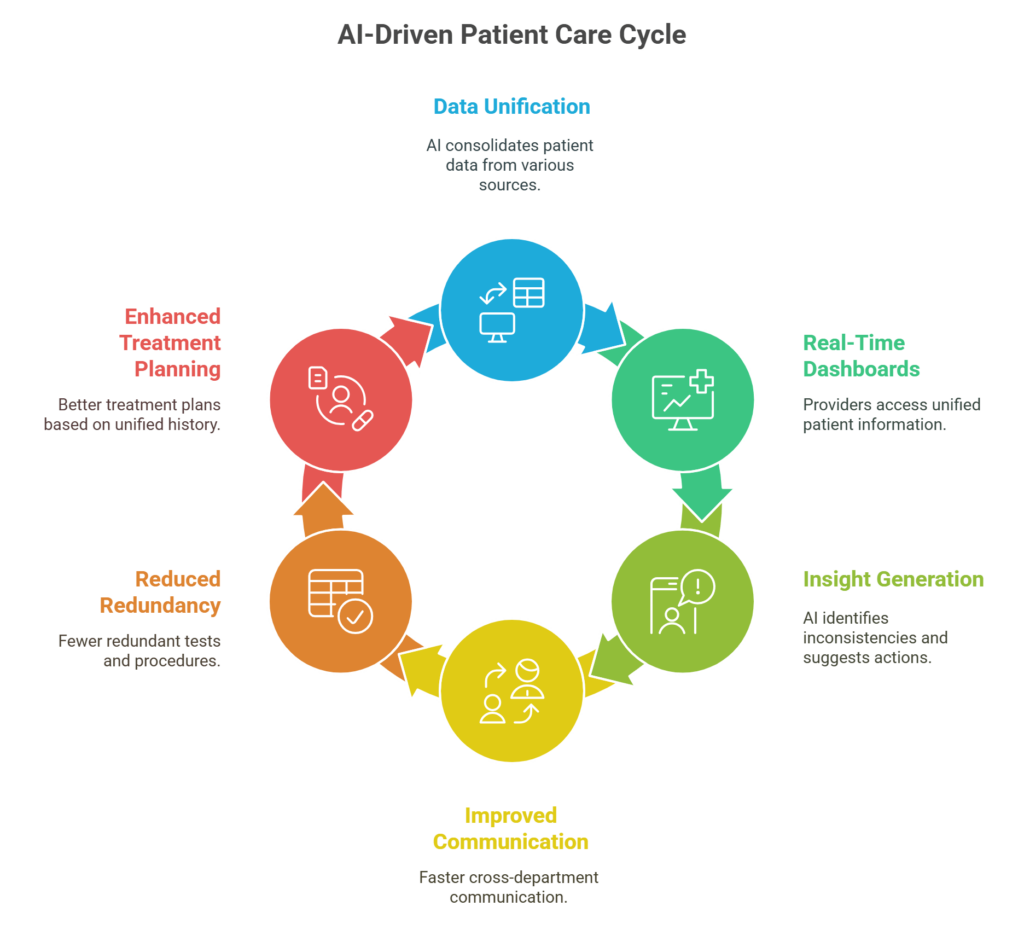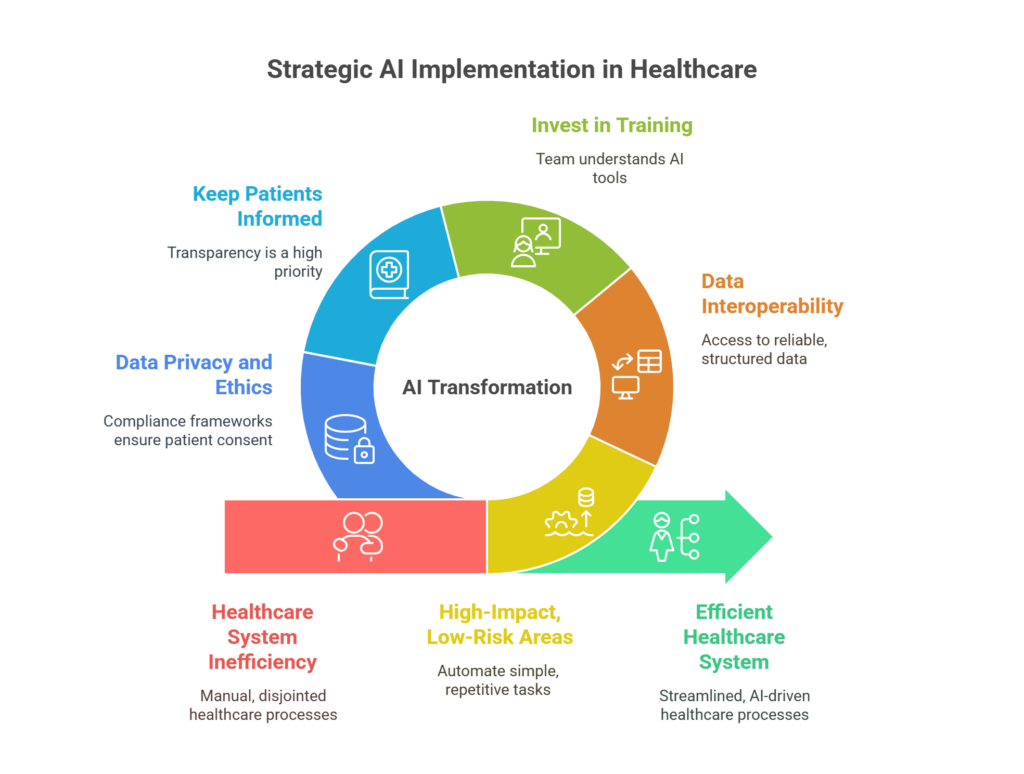A couple of weeks ago, headlines across the world lit up with news of a hospital in China run entirely by AI and robotic systems. Not just supporting care. Running it. No doctors or nurses in sight. Just patients, quietly navigating a facility where every clinical decision and operational task was handled by code.
It’s the kind of story that sparks awe and unease in equal measure.
And while it may feel like science fiction, for many in healthcare, the question isn’t “When will this happen?” but rather, “How do we apply AI in a way that still feels human?”
Because in real hospitals and clinics, care isn’t just about efficiency. It’s about connection. Patients don’t remember you for your perfectly streamlined scheduling system. They remember how they felt .. heard, reassured, supported.
At Enacton, we think AI shouldn’t replace that. It should protect it. Used well, AI can help providers spend less time buried in paperwork and more time focused on people. This is a goal at the heart of effective AI patient care management. It can flag issues before they become emergencies. It can support the quiet, invisible parts of care that matter just as much as the obvious ones.
In this article, we’re taking a closer look at how AI is helping healthcare providers manage patient care more intelligently, more proactively, and yes, more compassionately.
What AI in Healthcare Really Means Today
AI in healthcare refers to the use of machine learning algorithms and software to mimic human cognition in the analysis of complex medical data. From diagnosing diseases faster to managing administrative tasks more efficiently, AI tools are becoming part of the everyday healthcare workflow.
More than 80% of surveyed health system executives expect the proliferation of generative AI to have either a significant or moderate impact on their organizations in 2025. – 2025 global health care outlook by Deloitte.
At its core, this technology enables quicker, more accurate decisions, often based on data points human clinicians simply don’t have time to sift through manually. And while AI-powered hospitals might still feel futuristic, the real impact is already visible in how care is delivered and coordinated.
This evolution reflects a deeper integration of AI in healthcare patient care management, where clinical insights and administrative efficiencies come together to support better outcomes.
Managing Patient Care Smarter: How AI Helps in 2025
When we talk about how AI improves patient care management in 2025, we’re talking about more than automation, we’re talking about anticipation, adaptation, and connected care.
Managing a patient’s care journey isn’t just about scheduling appointments and refilling prescriptions. It involves anticipating needs, tracking recovery progress, spotting complications early, and keeping communication open. All at once.
In 2025, AI has become more integrated into the day-to-day systems healthcare providers use. Platforms using predictive analytics can now flag patients at risk of readmission, non-adherence, or deterioration, allowing providers to intervene early. AI patient care management also involves personalized reminders, treatment adaptation based on recovery metrics, and automated care coordination between departments.
Today’s AI patient care management platforms go beyond basic scheduling. These days they anticipate risk, streamline workflows, and personalize follow-ups based on real-time patient data.
Coordination Without the Chaos: Benefits of AI in Patient Care

Most hospitals still struggle with fragmented systems. A patient might see three different specialists, each using different software. AI steps in to unify data from these sources, giving providers a full picture of a patient’s history, test results, medications, and recovery trajectory.
With AI tools for patient care, providers get access to real-time dashboards that consolidate records, flag inconsistencies, and even suggest follow-up actions. These aren’t passive reports; they’re active systems dedicated to improving patient care with AI, one insight at a time.
The benefits of AI in patient care coordination include faster cross-department communication, fewer redundant tests, and better treatment planning based on a unified patient history.
Explore our custom mHealth app development services to see how we help providers build AI-integrated systems that support such coordination.
Remote Monitoring and Real-Time Support: Improving Patient Care with AI
AI remote patient monitoring is proving essential in post-discharge recovery. Smart wearables and home-based medical devices can now track everything from heart rate to glucose levels, sending alerts if something deviates from the norm.
On the engagement front, AI-powered chatbots and virtual assistants provide 24/7 interaction, helping patients stay informed and reducing the burden on clinical staff. These tools help answer questions, track medication adherence, and keep patients involved in their own care. Remote diagnostics are improving patient care with AI by offering clinicians deeper insights without needing patients to return to the hospital.
At Enacton, our telehealth software development solutions already incorporate these elements to bring more efficient patient engagement to digital platforms.
Mental Health Support: How AI Patient Engagement is Making a Difference with Mental Health Applications

Among the many mental health applications of AI, tools that analyze behavioral patterns and emotional cues are proving helpful in identifying early warning signs.
Mental health is an area where AI is making significant contributions. AI-powered platforms are now being used to detect signs of depression and anxiety through voice patterns, screen time habits, and interaction patterns with mobile apps.
Some AI mental health tools also provide daily check-ins, mindfulness nudges, and support escalation when necessary. They’re not a replacement for human therapists, but they offer a buffer, especially when access to mental health professionals is limited.
AI Patient Engagement in mental health, when designed ethically, provides an extra layer of care and support for individuals navigating ongoing mental health conditions.
Where to Start: AI Implementation Strategies for Healthcare Providers in 2025

Adding AI to existing healthcare systems isn’t just about installing software. It’s about planning a full transformation.
Here’s what we’re seeing work in 2025:
- Start with high-impact, low-risk areas: Automate appointment reminders, billing, and test follow-ups before moving into diagnostics.
- Ensure data interoperability: AI can only work if it has access to reliable, structured data across departments.
- Invest in training: Your team needs to understand how AI tools work, how to interpret their outputs, and when to rely on them.
- Keep patients informed: Make transparency a priority. Patients should know when and how AI is being used in their care.
We help healthcare teams implement AI strategically through healthtech software development and MVP development services that let them test solutions without full system disruption.
Equally important: data privacy and ethics. AI tools should follow strict compliance frameworks, ensuring patient consent, data encryption, and accountability in decision-making.
What’s Next: Agentic AI and Healthcare System Integration
What we’re also watching closely is the shift from reactive AI systems to agentic AI — where systems don’t just analyze but take proactive steps. Think of them like co-pilots that not only alert you about a problem but also recommend a specific course of action based on your system’s history, patient profile, and desired outcome.
This proactive model represents the next evolution in AI patient care management, where technology doesn’t just support decisions but actively shapes care delivery.
Platforms like xlwith.ai are exploring this agentic redirection. For telehealth, this could mean virtual assistants that schedule follow-ups, order tests, and even provide real-time instructions based on patient symptoms.
The ability to act, not just inform, is what will set apart the next generation of AI-powered tools in patient care management.
How We At EnactOn See It
While fully AI-run hospitals might feel like sci-fi, the true impact of AI in healthcare is already here and it’s more supportive than it is robotic. Patient care is becoming more efficient, more personalized, and more connected because of AI.
The challenge for healthcare providers isn’t whether to use AI. It’s how. At Enacton, we’re helping teams identify the right tools, implement them without disruption, and keep both providers and patients at the center of the experience.
Interested in building your own AI-powered patient portal or telemedicine solution? Check out our patient portal development guide or explore our MyChart clone to see what’s possible.
The future of patient care management is already unfolding and AI is helping write that story, one line of code at a time.
Frequently Asked Questions
What is AI in healthcare used for?
AI in healthcare is used for tasks like diagnosis, care coordination, patient monitoring, and predictive analytics. It helps clinicians make faster and more informed decisions.
How does AI improve patient care management?
AI supports patient care by anticipating issues, streamlining communication, automating reminders, and enabling real-time monitoring. In short, it’s improving patient care with AI across every stage of the journey.
Can AI help with remote patient monitoring?
Yes, AI powers wearable and home-based devices to track vital signs and alert providers when values go beyond safe limits. It’s a key part of virtual care models.
What are the benefits of AI for healthcare providers?
AI helps reduce administrative burden, improves decision accuracy, enhances patient outcomes, and enables more personalized care experiences.
